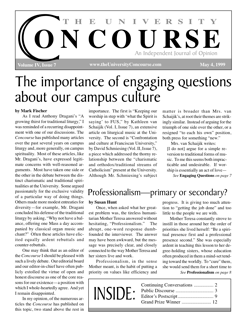How to become a leader
by Kathleen van Schaijik
The March 1999 issue of Fides—a promotional newsletter sent to friends and benefactors of FUS—featured an article titled “Transforming Students into Servant Leaders.” It was about the campus Institute for Catholic Leadership, which “provides training programs and seminars for Franciscan University students to develop their individual and group leadership skills.”
I confess I have less than no faith in such programs. Not, of course, that there is nothing worthwhile at all to be learned through them—no doubt they include lots of good and useful tips. But I’m afraid what good they contain will be outdone by the bad of giving students the silly and self-defeating illusion that they are being “transformed into leaders” by attending them. Real leadership is not so painlessly gained.
The content of the seminars that comes through in the article does nothing to allay my doubts. For instance, the article provides a list of “essential elements of servant-leadership:”
1. beginning by changing oneself
2. being a good listener
3. being empathetic and accepting of others
4. having a positive effect (healing influence) on people and situations
5. building community through cooperation
(Note that this list might just as well have been titled “characteristics of a very nice person.” It tells us nothing whatsoever about the essence of leadership.)
I propose an alternative program for would-be leaders:
1. Forget about leadership talks and time-management seminars.
2. Dedicate yourself to prayer, and to discerning the Divine Will for your life.
3. Throw yourself into your studies.
4. Make painful personal sacrifices for what you believe is true and right.
5. Write articles for the Concourse challenging the campus status quo.
I’m sure as anything this program will do a better job of transforming students into the sort of people who can wield an influence and inspire a following than any number of “Leadership Development Seminars.”


